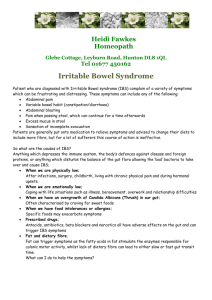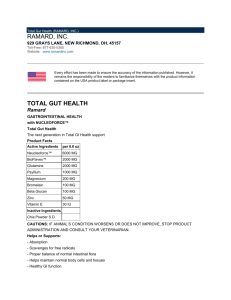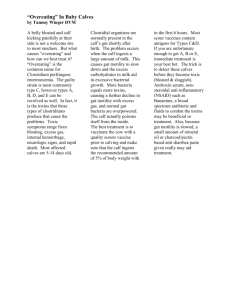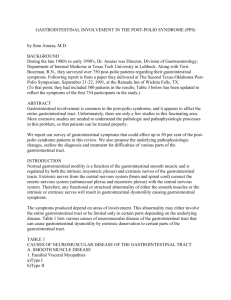Intestinal Dysmotility - Oxford University Hospitals NHS Trust
advertisement
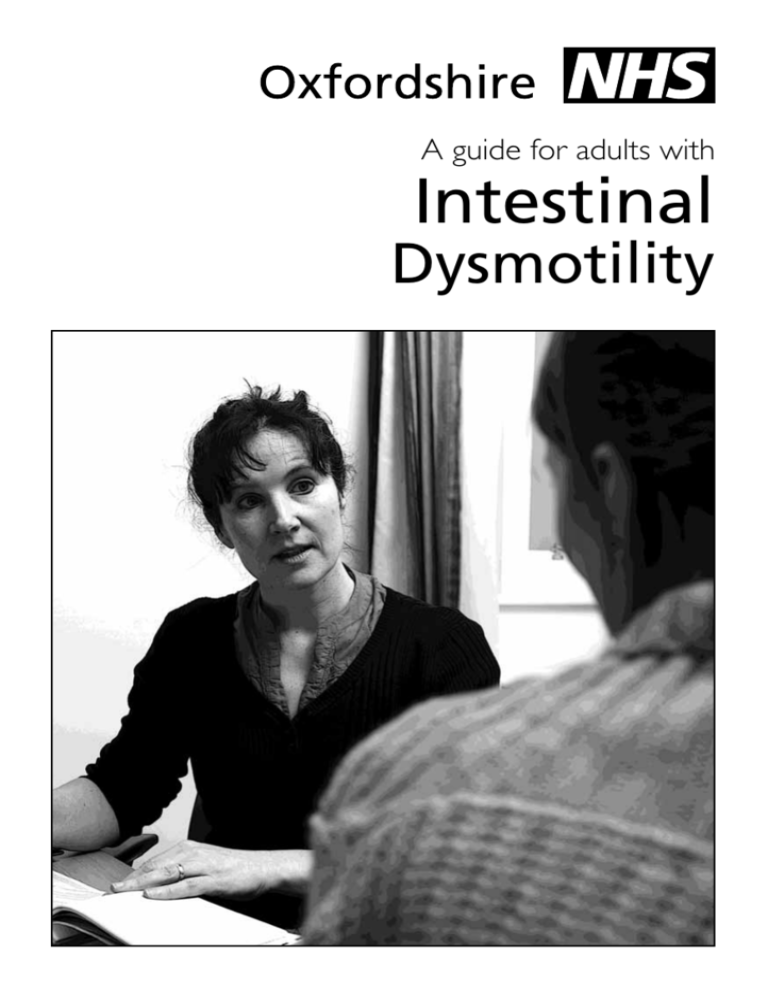
A guide for adults with Intestinal Dysmotility This leaflet contains information for patients with dysmotility of the gut and discusses symptoms and management . page 2 Contents Introduction 4 Symptoms 6 Causes 7 Investigations 8 Management 8 Help for individual patients 10 Further information 11 page 3 What is intestinal dysmotility? Intestinal dysmotility is the term used to describe a variety of symptoms that occur when the gut does not work properly at moving its contents (food, drink, tablets etc.) along. The muscles of the intestinal tract help to propel food from the mouth, down the oesophagus, through the bowel and out through the anus. This is a complicated process and takes part in many stages. Under normal circumstances, messages from the nerves tell the muscles to contract and then the muscles of the bowel have to contract in a co-ordinated fashion. Many different things can cause changes in motility. For example if you were nervous, you would expect gut motility to increase. This does not mean that you have dysmotility. Dysmotility occurs when the intestinal tract loses its ability to co-ordinate the muscular contractions of the bowel. The gut is highly complex and we do not fully understand the details of how the nerves and muscles which control it work in normal individuals or what exactly goes wrong in patients with dysmotility. Symptoms vary from one person to another in type and severity. It is a common condition but there are currently no data on the number of people who have it in the UK. page 4 A diagram of the gut Oesophagus Large intestine Small intestine Anus page 5 What are the symptoms? •Pain •Bloating •Difficult or disturbed bowel motions •Feeling full after having eaten only a small amount These may progress to: •Nausea •Vomiting •“Absolute constipation” (very severe constipation where you have no bowel motions and are unable to pass wind) Many of these symptoms overlap with a condition called Irritable Bowel Syndrome (IBS). IBS can also be thought of as a motility disorder, although in this condition the main problem is abdominal pain. Motility disorders are often chronic in nature (long-lasting or keeps coming back) and can dramatically affect a patient’s quality of life. It is not normal to pass blood if you have intestinal dysmotility. If this happens, it is important to see your GP. page 6 What causes intestinal dysmotility? Although we are still unable to explain exactly what causes most cases of dysmotility, certain medical conditions are known to contribute to it. Intestinal dysmotility has previously been considered a “functional” disorder in that we were unable to identify a structural cause. •Unknown – often no cause is found, and we call this idiopathic. Exciting research is being done to fill the gaps of our current understanding. There is some evidence that infections of the gut may be important. It may be that a family history is also significant. •Diabetes – 1 in 10 people with diabetes have some degree of dysmotility. This is because people with diabetes have higher sugar in their blood than normal and over time (usually at least 10 years) this damages nerves. •After gut surgery – it normally resolves without any future problems but may persist. •Gut problems at birth – children with certain structural abnormalities of the gut from birth may develop problems with dysmotility which persist into adulthood. Expert advice on management is advised. •Other – including Parkinson’s disease, systemic sclerosis and injury to nerves in the spinal cord. page 7 Will I need any investigations? When you are first seen, it may be that your doctor will want to perform a number of investigations, which may include blood tests and/or X-rays. This is to check that you do not have anything causing a physical blockage and also to consider the causes of dysmotility. Your doctor may also want to keep an eye on your blood tests, particularly to check you are getting enough vitamins and minerals. You may also be referred to a dietician to assess your diet as changing your diet can be benefical in dysmotility disorders. A dietician will also assess your nutritional status and check to make sure that you are not losing weight. How do we manage the condition? Unfortunately we do not yet have a cure for dysmotility but the condition can be managed and in most patients, the symptoms of dysmotility can be improved. Once a diagnosis is made, treatment can also be directed at any underlying cause (if there is one). Diet Every patient is an individual and foods which do not cause any problems for some people with dysmotility may trigger symptoms in others. At the moment we do not have any way to predict accurately which particular foods will trigger symptoms so trial and error may be needed to work out what is best for you. Our specialist dieticians can help work with you to assess and alter your diet. Diet manipulation is individually tailored to your needs. Often a small frequent meal plan is advised. In some cases you may be asked follow a liquid diet for a defined period of time. page 8 Some patients with dysmotility disorders can experience abdominal pain. It is very important that this symptom is controlled effectively and sometimes this may require specialist input from hospital and community pain teams. Abdominal pain can sometimes be difficult to treat because many of the commonly-used pain killers can alter bowel motility and make problems such as constipation worse. In cases that are particularly difficult to treat, Doctors, Nurses and Pharmacists working on specialist Pain Teams can help to minimise some of these side effects. We also know that treating anxiety and depression may help to control abdominal pain. If you are experiencing low moods or think that your symptoms get worse when you are feeling anxious, please tell your doctor. Please tell your health professional if you have lost weight without meaning to. If you are not getting enough nutrition because of dysmotility, health professionals may want to discuss alternative feeding options with you. Medicines There are lots of medicines that your doctor or pharmacist can recommend to help with your symptoms. These may include medicines known as laxatives to help with constipation, prokinetics which may help to speed up the bowel and medication to help control feelings of sickness and nausea. As with all medicines, it is important to take these correctly and follow any instructions that you are given. It is always helpful to bring your medications to any clinic appointment. Surgery Surgery is rarely used to treat dysmotility in the UK. page 9 Help for individual patients Your GP can refer you to a gastroenterologist (a hospital doctor who specialises in the gut) who has experience of treating people with intestinal dysmotility. Other health professionals such as pharmacists and pain control experts may make up part of the multi-disciplinary team which will help you gain control over your condition. If you would like further advice from a State Registered Dietitian, please ask your GP or hospital doctor to refer you. page 10 Further information Diagrams and information about the gut Click on links to large intestine and small intestine for clear explanations of how the gut works with interactive diagrams http://www.bbc.co.uk/science/humanbody/ An introduction to dysmotility by the BBC http://www.bbc.co.uk/health/conditions/dysmotility1.shtml Gastroparesis and Dysmotilities USA This Association has now closed but the website is still running and continues to offer helpful dietary suggestions. www.digestivedistress.com Hirschsprung’s and Motility Disorders Support Network (worldwide) Please be aware this site focuses mostly on Hirschsprung’s disease, a very specific type of dysmotility disorder and much of the advice will not apply to most patients with dysmotility http://www.hirschsprungs.info/ Complementary therapies If you are considering any alternative treatments it would be wise to consult a therapist who is registered with the relevant professional institute. To find a reputable practitioner contact www.i-c-m.org.uk Please tell your doctor if you are thinking of doing this. page 11 This booklet was produced with the input of the whole gastroenterology team at the John Radcliffe Hospital. Mrs. S Cripps (pharmacy), Miss J. Behari (dietician), Dr E. Johns (research) , Dr T. Ambrose (trainee) and Dr A. Rajendran (trainee) made helpful suggestions. If you need an interpreter or need a document in another language, large print, Braille or audio version, please call 01865 221473 or email PALSJR@orh.nhs.uk Dr Victoria Nowak, Dr Simon Travis, Dr Satish Keshav Version 1, September 2010 Review, September 2013 Oxford Radcliffe Hospitals NHS Trust Oxford OX3 9DU www.oxfordradcliffe.nhs.uk/patientinformation OMI 1832
